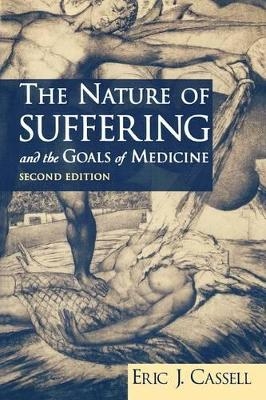
The Nature of Suffering and the Goals of Medicine
Seiten
2004
|
2nd Revised edition
Oxford University Press (Verlag)
978-0-19-515616-4 (ISBN)
Oxford University Press (Verlag)
978-0-19-515616-4 (ISBN)
This is a revised and expanded edition with three new chapters and a new preface summarizing the progress in the area of pain management. In addition, the argument will appeal to psychologists and psychiatrists interested in the nature of pain and suffering.
This is a revised and expanded edition of a classic in palliative medicine, originally pulished in 1991. With three new chapters and a new preface summarizing the progress in the area of pain management, this is a must-have for those in palliative medicine and hospice care.
The obligation of physicians to relieve human suffering stretches back into antiquity. But what exactly is suffering? One patient with metastatic cancer of the stomach, from which he knew he would shortly die, said he was not suffering. Another, someone who had been operated on for a minor problem - in little pain and not seemingly distressed, said that even coming into the hospital had been a source of pain and suffering. With such varied responses to the problem of suffering, inevitable questions arise. Is it the doctor's responsbility to treat the disease or the patient? What is the relationship between suffering and the goals of medicine?
According to Dr Eric Cassell these are cruical questions, but unfortunately have remained only queries void of adequate solutions. It is time for the sick person, Cassell believes, to be not merely an important concern for physicians but the central focus of medicine. With this in mind, Cassell argues for an understanding of what changes should be made in order to successfully treat the sick while alleviating suffering, and how to actually go about making these changes with the methods and training techniques firmly rooted in the doctor's relationship with the patient.
Dr Cassell offers an incisive critique of the approach of modern medicine. Drawing on a number of evocative patient narratives, he writes that the goal of medicine must be to treat an individual's suffering, and not just the disease. In addition, Cassell's thoughtful and incisive argument will appeal to psychologists and psychiatrists interested in the nature of pain and suffering.
This is a revised and expanded edition of a classic in palliative medicine, originally pulished in 1991. With three new chapters and a new preface summarizing the progress in the area of pain management, this is a must-have for those in palliative medicine and hospice care.
The obligation of physicians to relieve human suffering stretches back into antiquity. But what exactly is suffering? One patient with metastatic cancer of the stomach, from which he knew he would shortly die, said he was not suffering. Another, someone who had been operated on for a minor problem - in little pain and not seemingly distressed, said that even coming into the hospital had been a source of pain and suffering. With such varied responses to the problem of suffering, inevitable questions arise. Is it the doctor's responsbility to treat the disease or the patient? What is the relationship between suffering and the goals of medicine?
According to Dr Eric Cassell these are cruical questions, but unfortunately have remained only queries void of adequate solutions. It is time for the sick person, Cassell believes, to be not merely an important concern for physicians but the central focus of medicine. With this in mind, Cassell argues for an understanding of what changes should be made in order to successfully treat the sick while alleviating suffering, and how to actually go about making these changes with the methods and training techniques firmly rooted in the doctor's relationship with the patient.
Dr Cassell offers an incisive critique of the approach of modern medicine. Drawing on a number of evocative patient narratives, he writes that the goal of medicine must be to treat an individual's suffering, and not just the disease. In addition, Cassell's thoughtful and incisive argument will appeal to psychologists and psychiatrists interested in the nature of pain and suffering.
Eric J Cassell is Clinical Professor of Public Health at Weill Medical College of Cornell University and an attending physician at The New York-Presbyterian Hospital. He is a Fellow and a member of the Board of Directors of the Hastings Center, as well as a member of the Institute of Medicine of the National Academy of Sciences and a Master of the American College of Physicians. His recent books include Changing Values in Medicine, Talking with Patients, and Doctoring.
EPILOGUE: THE CARE OF THE SUFFERING PATIENT
| Erscheint lt. Verlag | 8.4.2004 |
|---|---|
| Zusatzinfo | numerous black and white photographs and line drawings |
| Verlagsort | Oxford |
| Sprache | englisch |
| Maße | 156 x 239 mm |
| Gewicht | 458 g |
| Themenwelt | Geisteswissenschaften ► Psychologie ► Klinische Psychologie |
| Medizin / Pharmazie ► Medizinische Fachgebiete ► Palliativmedizin | |
| Medizin / Pharmazie ► Medizinische Fachgebiete ► Psychiatrie / Psychotherapie | |
| Medizin / Pharmazie ► Medizinische Fachgebiete ► Schmerztherapie | |
| ISBN-10 | 0-19-515616-1 / 0195156161 |
| ISBN-13 | 978-0-19-515616-4 / 9780195156164 |
| Zustand | Neuware |
| Haben Sie eine Frage zum Produkt? |
Mehr entdecken
aus dem Bereich
aus dem Bereich
Information • Energie • Materie
Buch | Softcover (2015)
Lehmanns Media (Verlag)
CHF 41,90
Buch | Hardcover (2024)
Kohlhammer (Verlag)
CHF 219,95
Manual zur Dokumentation des psychischen Befundes in Psychiatrie, …
Buch | Softcover (2023)
Hogrefe Verlag
CHF 39,95


